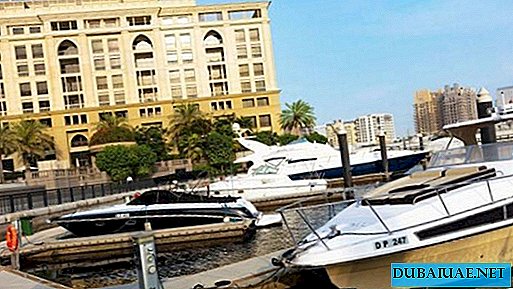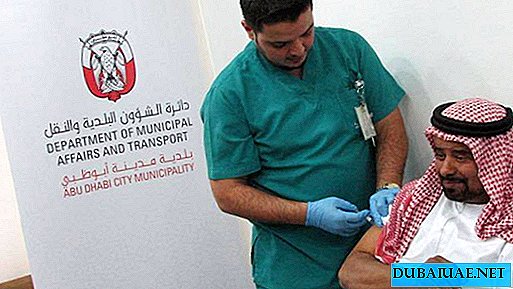
According to a report from the Dubai Land Department, Russian citizens rank fifth among foreigners buying real estate in this emirate popular with tourists. The Russians skipped ahead the Indians, Pakistanis, British and Iranians and were ahead of the Americans and Canadians. For the first half of 2012, Russian citizens spent $ 400 million on the purchase of about 700 real estate in the resort city of Dubai. Is it a lot or a little? It depends on what you compare it to.
For example, in countries such as Bulgaria or Montenegro, Russians are buying real estate so actively that sometimes you forget that you are abroad when you speak Russian on the coast. What prevents Russians from being active in the Dubai real estate market? Perhaps many simply are not familiar with the Dubai reality or look at Dubai through the prism of myths inspired by the transmission on television or the stories of acquaintances. We will try to dispel these myths.
1 MYTH Dubai - these are exceptionally luxurious penthouses that you can save your whole life for.
In fact, without exaggeration, we can say that in Dubai you can find housing for every taste and even any wallet. For example, the price per square meter of an apartment in one of the newest areas of Dubai JLT (Jumeirah Lakes Towers) is much lower than the price per square meter of "Khrushchev" on the outskirts of Moscow, and starts with about 2.5 thousand dollars. For the money you buy a view from the window of a skyscraper, underground parking, a swimming pool, a gym in the house and a beach in a 15-20 minute walk or ten minutes by car. Prices for apartments right by the sea on the artificial island of The Palm Jumeirah start at 3-3.5 thousand dollars per square meter.
The prices for apartments in the Dubai Marina skyscrapers located at the sea are about the same, an area that resembles American Manhattan in the number and variety of high-rise buildings. In most houses, along with spacious two-, three- and four-room apartments, there are one-room studios at a more modest price. At the same time, real estate in Dubai is rented out by developers already finished, fully equipped with plumbing and kitchen furniture, and in most projects with built-in appliances. The UAE differs from most countries in that you do not have to pay any taxes for owning real estate, as well as for renting it out. Another thing is the cost of maintaining the property. If you are buying, but not renting a villa or apartment in Dubai, you should remember that the owner of the property is obliged to pay the costs of its maintenance, including the protection of the building, cleaning and landscaping of the common territory (parking, pool), garbage removal, and so on. As a rule, such payments are charged annually and in Dubai can range from 20 to 80 dollars per square meter per year, depending on the specific project. Even if you rent real estate, then temporary residents will pay for light and water, and if we are talking about a villa or a town house, then for the maintenance of the land, but not for the maintenance and improvement of the territory of the residential complex, which most of the costs.

2 MYTH Buying property in Dubai makes sense only by the sea.
In reality, to buy an apartment by the sea or not is a matter of taste. Many of those who buy property in Dubai to spend their holidays here come here just for the sake of the sea, therefore they prefer apartments in coastal areas. But there are those who, for example, do not want to live in an area where there are many tourists, they are afraid to get tired of the constant contemplation of the sea landscape or buy an apartment solely for investment purposes - for rental purposes.
There are a number of opportunities for them in Dubai. For example, Dubai's cottage areas - villas are more likely to be suitable for families with small children or people looking for more privacy. For the price of 2.5 thousand dollars per square meter, you get a townhouse (The Springs sleeping area) or a separate house (for example, in such popular areas as the Jumeirah Islands or The Meadows) with all communications; places for walking, landscape design, silence, tranquility and at the same time proximity to civilization.
In cottage areas of Dubai, unlike the same suburbs, there are no high fences and angry dogs. You do not need to fence yourself off from other residents, fearing for your property. According to a Gallup World Poll poll, 95% of the UAE people feel safe being alone at night on the street, which is the highest rate among all countries in the world.
In addition to villas in green cottage areas and skyscrapers by the sea, in Dubai there are other options for choosing housing. There are intermediate options like The Greens. It lives up to its name - there are really a lot of greens here, and with its 7-8 story houses and green streets, it resembles resort residential areas in European countries. There are also tall towers, whose windows overlook the lawns of one of Dubai's most famous golf clubs - Emirates Golf Club. At the same time, you can reach the sea from here by car in just 10-15 minutes or in 20-30 minutes by public transport.
3 MYTH It is unprofitable to buy housing in Dubai, because its prices have fallen due to the crisis.
Many people remember that Dubai was one of the first places outside the United States that was hit by the global financial crisis, and that the real estate market in the emirate fell into deep stagnation. However, recently, real estate and rental prices have been rising again and are closely approaching pre-crisis values. According to the estimates of the reputable global consulting agency Jones Lang LaSalle, as of May 2012, villa prices increased by 21% compared to the same period last year and were 9% higher than the level of the beginning of 2008. Apartment prices are not recovering so quickly and so far remain 18% lower than in January 2008. As for the cost of rental housing, it in annual terms grows by an average of 10% in both segments. In addition, you should pay attention to the fact that until very recently no new real estate projects have been launched in Dubai, but only the old ones that started before the crisis were only completed.
 This means that in the next few years, the supply of new housing will be severely limited (according to the same agency, 24 thousand apartments and villas will be commissioned in 2012, 14 thousand in 2013, and only 3 thousand in 2014). At the same time, the demand for the purchase and rental of real estate in connection with the growth of the economy of Dubai and good prospects for business activity in the Gulf countries and the Middle East is expected to grow. Moreover, instead of unskilled labor, which was previously employed in the construction sector and became unnecessary due to the crisis, skilled workers from developed countries often come to Dubai. Therefore, in addition to the high potential for growth in value, residential real estate in Dubai is capable of generating high current rental income - much higher than, for example, in Russia or Western Europe. If we talk about average market indicators, for housing in Dubai today the indicator of net rental income (that is, rental income minus all expenses for servicing real estate) is on average 5-10% per annum, depending on the type and category of real estate, its location and cost of service. If the owner agrees to entrust the real estate agency with the delivery of his housing for short-term rent, and he intends to come to Dubai, for example, only in the summer and on New Year's, then the income may be even higher.
This means that in the next few years, the supply of new housing will be severely limited (according to the same agency, 24 thousand apartments and villas will be commissioned in 2012, 14 thousand in 2013, and only 3 thousand in 2014). At the same time, the demand for the purchase and rental of real estate in connection with the growth of the economy of Dubai and good prospects for business activity in the Gulf countries and the Middle East is expected to grow. Moreover, instead of unskilled labor, which was previously employed in the construction sector and became unnecessary due to the crisis, skilled workers from developed countries often come to Dubai. Therefore, in addition to the high potential for growth in value, residential real estate in Dubai is capable of generating high current rental income - much higher than, for example, in Russia or Western Europe. If we talk about average market indicators, for housing in Dubai today the indicator of net rental income (that is, rental income minus all expenses for servicing real estate) is on average 5-10% per annum, depending on the type and category of real estate, its location and cost of service. If the owner agrees to entrust the real estate agency with the delivery of his housing for short-term rent, and he intends to come to Dubai, for example, only in the summer and on New Year's, then the income may be even higher.
4 MYTH A foreigner does not have the right to take ownership of real estate in Dubai.
 It is no secret that in many countries of the world foreigners do not have the right to buy real estate and register it in their property. In these countries, buyers have to resort to the help of local residents or register local companies, buying a property on their behalf. There are no such problems in Dubai. Many believe that real estate in Dubai can only be purchased for long-term rent for 99 years. However, it is not. Citizens of foreign countries that are not members of the Arab Gulf Cooperation Council (GCC) have the right to fully acquire property in Dubai.
It is no secret that in many countries of the world foreigners do not have the right to buy real estate and register it in their property. In these countries, buyers have to resort to the help of local residents or register local companies, buying a property on their behalf. There are no such problems in Dubai. Many believe that real estate in Dubai can only be purchased for long-term rent for 99 years. However, it is not. Citizens of foreign countries that are not members of the Arab Gulf Cooperation Council (GCC) have the right to fully acquire property in Dubai.
True, in specially designated territories, in the so-called freehold zones. The list of such zones is established by Decree of the ruler of Dubai No. 3 of 2006. These include almost the entire territory of "new Dubai", including such popular areas as Dubai Marina, The Palm Jumeirah, Emirates Living, Jumeirah Lakes Towers, Downtown Dubai and others.
To buy an apartment or a villa in his name, a foreign citizen needs to show only his passport. In most cases, buyers turn to real estate agencies, without which virtually no transaction is complete in Dubai.
5 MYTH The process of buying property in Dubai is complex and opaque.
 Of all the seven emirates that make up the UAE, Dubai has the most developed and transparent legislative base in real estate. Registration of real estate transactions is carried out by the Dubai Land Department at the time of contact of the seller and the buyer, who is issued a registration certificate certifying his ownership of the acquired property. This "instant" registration procedure maximally simplifies the process of buying and selling real estate and minimizes possible risks from both the seller and the buyer. Compliance with the law is exercised by the Dubai Real Estate Market Regulatory Agency (RERA). It, in particular, is responsible for the registration of real estate projects, as well as for the mandatory registration of developers, real estate agencies and the agents themselves. RERA's activity is primarily aimed at protecting the rights and interests of buyers and sellers and is designed to minimize the possibility of fraud on the part of agents.
Of all the seven emirates that make up the UAE, Dubai has the most developed and transparent legislative base in real estate. Registration of real estate transactions is carried out by the Dubai Land Department at the time of contact of the seller and the buyer, who is issued a registration certificate certifying his ownership of the acquired property. This "instant" registration procedure maximally simplifies the process of buying and selling real estate and minimizes possible risks from both the seller and the buyer. Compliance with the law is exercised by the Dubai Real Estate Market Regulatory Agency (RERA). It, in particular, is responsible for the registration of real estate projects, as well as for the mandatory registration of developers, real estate agencies and the agents themselves. RERA's activity is primarily aimed at protecting the rights and interests of buyers and sellers and is designed to minimize the possibility of fraud on the part of agents.
6 MYTH Dubai is an Arab city in which only Muslims, sheikhs and women in black live.
Only those who have never been to Dubai and think that all the Gulf countries are the same can think so. In fact, Dubai is perhaps the most “western” and democratic of all Arab cities. This is not Saudi Arabia, where even European women cannot go out with bare shoulders and head. Only 10% of the local population lives in Dubai, and the remaining 90% are foreigners, people from completely different countries of the world, with their own cultural characteristics and traditions. Nobody forces them to change their usual way of life, besides, such a huge number of people is simply impossible even with a great desire to impose all the orders of local residents.
In areas where foreigners have the right to buy real estate, your neighbors will most likely be primarily Europeans. Yes, they may be Arabs, but visiting Arabs from other countries, that is, foreigners are the same as you. And you will meet representatives of the local population only in state institutions, shopping centers or other crowded places. Of course, the cultural traditions and characteristics of the indigenous population of the UAE must be respected, including in Dubai. In particular, during the Muslim fasting moon month, Ramadan, which takes place once a year, restaurants and cafes will be closed all day and will open only after sunset. Also, residents and guests of the UAE are asked during this period to refrain from eating, drinking and smoking on the street and in public places during the day.
7 MYTH In Dubai, it's always hot and nothing to do
 In Dubai, 345 days a year are sunny. But this does not mean that hellish heat is standing here all the time. The heat, indeed, is, but only in the summer. At this time, the elderly, as well as those who have small children, are trying to leave the country. The temperature in the summer is often above + 40 ° C. But in winter, the average temperature does not exceed + 25 ° C. In spring and autumn, the weather is comfortable, it is not in vain that these seasons the tourism industry workers call "velvet". Sea temperature almost never drops below + 25 ° C. Needless to say, in Dubai, with its well-developed infrastructure and quality of life, air conditioners are installed even at indoor bus stops, so even in the summer you won’t have to suffer from the heat and stuffiness.
In Dubai, 345 days a year are sunny. But this does not mean that hellish heat is standing here all the time. The heat, indeed, is, but only in the summer. At this time, the elderly, as well as those who have small children, are trying to leave the country. The temperature in the summer is often above + 40 ° C. But in winter, the average temperature does not exceed + 25 ° C. In spring and autumn, the weather is comfortable, it is not in vain that these seasons the tourism industry workers call "velvet". Sea temperature almost never drops below + 25 ° C. Needless to say, in Dubai, with its well-developed infrastructure and quality of life, air conditioners are installed even at indoor bus stops, so even in the summer you won’t have to suffer from the heat and stuffiness.
As already mentioned, 90% of expatriates live in Dubai, and most of them, as you know, come to Dubai to work and earn money. This city is a large metropolis, which boils not only resort, but also business life. Dubai is located at the intersection of air and sea trade routes between Europe, Africa and Asia and rightfully claims to be the largest center for business activity in the Middle East. For this, there is almost everything: free economic zones, which host the regional headquarters of leading international companies, the region’s largest seaport with modern infrastructure, the existing Dubai International Airport and the new Sheikh Maktum Airport, which should become the most big in the world. Many people call Dubai "the city of the future", because it is amazing how a modern metropolis with a developed network of roads, shopping centers, which have everything, even ski slopes and ice arenas, water parks, a completely "space" metro, has grown so quickly and rapidly on the desert site . World-famous sports competitions and international exhibitions are regularly held here, popular world artists come to perform.
It is no coincidence that, according to Master Card, Dubai in 2012 became the eighth of the most visited cities in the world, beating New York, Barcelona and Rome. Faced with this reality, most myths simply can not stand.
You can get any additional information about the acquisition and management of your property in Dubai from the specialists of IMEX Real Estate by tel. in Moscow +7 495 5100008, toll-free number in the UAE 800-IMEX (800-4639) or by sending a request by e-mail [email protected].










